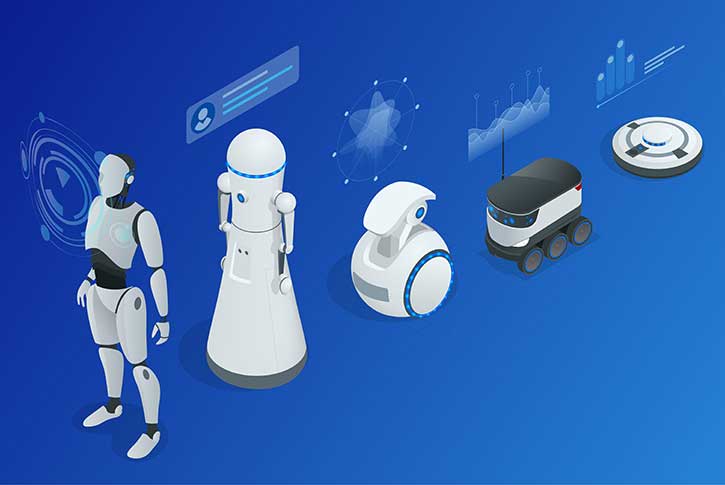Share This
The Role of Artificial Intelligence in the Future of SEO

Artificial Intelligence (AI) is revolutionizing the digital landscape. Its impact on various industries, including digital marketing, cannot be overstated. The rise of AI has brought about a paradigm shift in digital marketing. As search engines evolve, they increasingly rely on AI-powered algorithms to understand user intent and deliver relevant search results. From personalized recommendations to chatbots and voice assistants, AI is enhancing customer experiences and driving targeted marketing efforts.
To thrive in the digital landscape, understanding the impact of AI on search engine optimization (SEO) is not just vital, but practically necessary. Stay tuned as we delve deeper into the ways AI is shaping the future of SEO and explore actionable strategies to thrive in this AI-powered landscape.
AI-Powered Search Algorithms
Traditional search engines rely on complex algorithms to crawl and index websites, using criteria such as keywords, backlinks, and site authority to retrieve relevant results. However, this approach can occasionally lead to diverse and irrelevant outcomes, as it heavily relies on specific keyword usage and can be susceptible to manipulation through keyword-stuffing tactics. Even with improvements, as seen with Google’s RankBrain algorithm, which incorporates machine learning to better understand user intent, challenges remain in consistently delivering precise results. Ambiguity in user intent, contextual understanding, evolving language and trends, manipulative SEO techniques, data quality, and rapidly changing information often hinder consistent result accuracy.
To overcome these limitations and provide an enhanced search experience, generative AI search engines have emerged. With natural language processing, AI-driven search engines interpret user queries and offer relevant and human-like responses. This conversational aspect enables users to ask follow-up questions and receive personalized results tailored to their needs, augmenting the search experience beyond simple keyword matching.
In comparison to traditional search engines, generative AI search engines strive to understand user intent more accurately, reducing the chances of broad or irrelevant outcomes. Sophisticated algorithms, like those found in Microsoft’s Bing AI-powered search engine, allow these systems to adapt to user preferences and deliver more personalized search results.

AI-Driven Content Creation and Optimization
Various techniques and technologies, such as natural language processing and machine learning, enable the creation of AI-generated content. Machine learning algorithms use their understanding of patterns to produce original text that emulates human speech. They learn to generate blog articles, photo captions, and webpage meta descriptions. Image-based algorithms use training datasets to generate photos, illustrations, and videos. Content marketers also utilize this tool to efficiently tag, categorize, and sort large quantities of images.
AI-generated content can cater to specific keywords, optimize meta tags, and align with SEO best practices. While AI can generate text efficiently, users must strike a balance between automation and human creativity to ensure the content is engaging, unique, and adds value to the audience. By relying solely on content generated by large language models, the effectiveness of a content marketing strategy can be significantly diminished. Unremarkable content lacking a unique perspective or compelling brand voice can result in reduced engagement and overall interest from website visitors.
Regardless, we are already witnessing the impact of AI on content marketing strategies. HubSpot’s Content Strategy tool employs machine learning to aid marketers in discovering high-quality content ideas that drive conversions. It swiftly verifies these ideas to identify popular themes and enhance search engine ranking. By sifting through millions of relevant postings, the system recommends topic clusters that differentiate the user from competitors, eliminating guesswork and streamlining the creation of content marketing campaigns that convert.
AI in Voice Search and Natural Language Processing
The growing prevalence of voice search necessitates businesses to adapt their digital marketing strategies accordingly. Voice search involves utilizing digital assistants like Siri and Alexa to retrieve information or execute tasks through voice commands. With the increasing popularity of smart speakers and voice-enabled devices, voice search is poised to have a profound impact on SEO and digital marketing.
While text-based searches typically consist of concise phrases or keywords, voice searches involve natural language and complete sentences. Consequently, businesses must optimize their content by incorporating keywords and phrases that align with the way people naturally speak. This adaptation ensures that their content resonates with voice search users and improves its visibility in search engine results pages.
In addition to optimizing for conversational language, businesses should consider the context and intent behind voice queries. Voice search often occurs in specific situations, such as when users seek immediate information or require hands-free assistance. Understanding these user contexts allows marketers to tailor their content to provide relevant and timely responses, meeting the needs of voice search users effectively.
Businesses that leverage natural language processing and machine learning algorithms can optimize their voice search keywords. AI-powered tools analyze extensive voice data, identify relevant keywords and phrases, and offer insights into user intent. This enables businesses to refine their keyword strategies, create suitable content to fulfill voice search queries, and enhance visibility and engagement.

AI and User Experience (UX) Optimization
The user experience refers to how users interact with and experience a product, system, or service. It includes their perception of utility, ease of use, and efficiency when using it. UX and SEO work together to provide the best possible experience for users.
SEO focuses on optimizing websites to rank higher in search engine results and attract organic traffic. UX concentrates on enhancing the overall experience and satisfaction of website visitors. A well-designed and user-friendly website that prioritizes UX principles, such as intuitive navigation, fast loading times, and engaging content, not only improves the user experience but also aligns with SEO best practices. When users have a positive experience on a website, they are more likely to stay longer, explore additional pages, and interact with the content, which can generate conversions.
AI plays a pivotal role in improving UX and SEO through personalization and predictive analytics. Algorithms utilizing user data can deliver the most relevant experiences, personalized recommendations, and optimized search results. This typically enhances user engagement, satisfaction, and conversion rates while elevating website visibility and search engine rankings.
AI and Link Building
Link building is acquiring hyperlinks from external websites to boost one’s online presence. Search engines regard backlinks as indicators of credibility and influence. Effective link-building can enhance website visibility, improve organic rankings, and generate referral traffic.
For example, imagine you operate a pet training blog and you want to increase your website’s authority. You could reach out to reputable pet training experts and ask them to write a guest post for you. By collaborating with these experts, you not only gain high-quality content for your website but also benefit from their established credibility and audience. You can also offer to write a guest post for them, further expanding your reach and building valuable connections within the fitness community. This exchange of backlinks helps establish your website as a reliable source of information and enhances its visibility, potentially driving more traffic to your blog.
Algorithms play a significant role in analyzing competitors’ backlink profiles, identifying areas that can be improved, and replicating valuable backlinks. AI-powered tools are capable of evaluating the quality of backlinks and detecting harmful links that may impact a website’s ranking. Additionally, AI can personalize the user experience, increasing engagement and the likelihood of obtaining backlinks. Predictive analytics, through data analysis, enable the identification of potential opportunities for link building and provide recommendations for effective strategies.
The assistance of AI-powered tools is valuable in identifying relevant websites and blogs that can contribute backlinks to content. By analyzing the content of other websites, these tools can uncover prospects for guest posting or link building. AI technology streamlines the process of discovering opportunities, enabling marketers and businesses to enhance their online presence and strengthen their link profiles.
However, AI can also have negative implications for link building. The increasing prevalence of AI-generated content has led to a decline in the overall quality of content found on search results pages. Marketers are already facing challenges dealing with a flood of mediocre content from low-authority websites. The rise of this type of content aggravates this issue. This phenomenon allows individuals lacking the necessary skills to create content, making it more difficult to differentiate between high-quality content and noise. As a result, distinguishing genuine, valuable content from AI-generated content will continue to pose an ongoing challenge in the digital landscape.

The Ethical Considerations of AI in SEO
AI offers numerous benefits in enhancing SEO strategies and improving outcomes. However, these advancements raise concerns regarding privacy and data security. AI algorithms often rely on vast amounts of user data to train their performance. While this data can provide priceless insights and create personalized experiences, it also raises questions about the protection and ethical use of personal information. Balancing the benefits of AI and ensuring robust privacy safeguards is crucial to maintain consumer trust.
As AI continues to evolve, there is apprehension about its potential impact on job opportunities within the SEO industry. AI-powered tools and automation can streamline processes, from keyword research and content creation to data analysis. While some routine tasks may become automated, the need for human expertise remains critical. SEO professionals can partner with AI to augment their capabilities and efficiency, focusing on more strategic and creative aspects of their work. This shift in job roles necessitates learning new skills and adapting to work collaboratively with AI, ensuring the industry’s workforce remains relevant.
Responsible and ethical AI implementation is paramount in the SEO landscape. AI algorithms can significantly influence search engine rankings and user experiences. Therefore, ensuring transparency, fairness, and unbiased decision-making is crucial. Biases in data or algorithms can lead to unintended consequences, perpetuating discrimination or misinformation. Marketers and businesses can address these challenges by embracing diversity and inclusivity in data collection and conducting rigorous testing to minimize biases. Maintaining transparency in AI implementation and obtaining informed consent from users fosters trust and promotes ethical practices in the SEO industry.
Preparing for the Future of AI-Driven SEO
The future of SEO is intricately linked with AI, creating a dynamic landscape that requires adaptability and a proactive approach. To thrive in an AI-powered world, businesses must fully welcome the capabilities of AI.
Education and training play a pivotal role in empowering digital marketing teams to employ the power of AI effectively. By equipping themselves with the necessary skills and knowledge, marketers can leverage AI to its full potential. Staying updated with the latest trends and technologies is equally crucial, as it enables marketers to stay informed and agile, ready to adapt their strategies and tools to capitalize on emerging opportunities.
The potential of AI to streamline workflows and enhance SEO cannot be exaggerated. By automating repetitive tasks and exploiting AI algorithms, marketers and businesses can optimize their resource allocation, allowing them to focus on more strategic initiatives. This shift in focus increases productivity and efficiency, leading to improved overall performance.
Collaborating with experienced AI and digital marketing professionals is invaluable in navigating the complexities of AI-driven marketing. Their expertise and insights guide businesses in making the most of AI’s potential while adhering to effective and ethical practices. Companies that take advantage of their knowledge can develop robust strategies, make informed decisions, and capitalize on AI to achieve their marketing goals.

Go with the AI Flow
AI’s ability to analyze vast amounts of data, predict user behavior, and automate tasks has revolutionized the SEO landscape. AI-powered tools have transformed keyword research, content creation, and link-building strategies, enabling marketers to make data-driven decisions and deliver more relevant and engaging experiences to their audience.
As AI continues to evolve and shape the digital marketing landscape, staying updated with the latest trends and methods is an ongoing struggle with potentially large rewards. It’s time to harness the potential of AI and pave the way for a future where SEO and artificial intelligence work hand in hand to drive success.